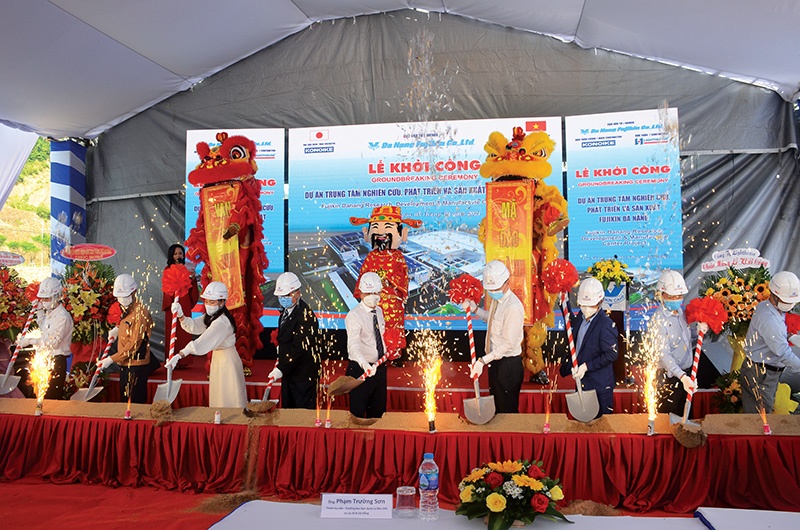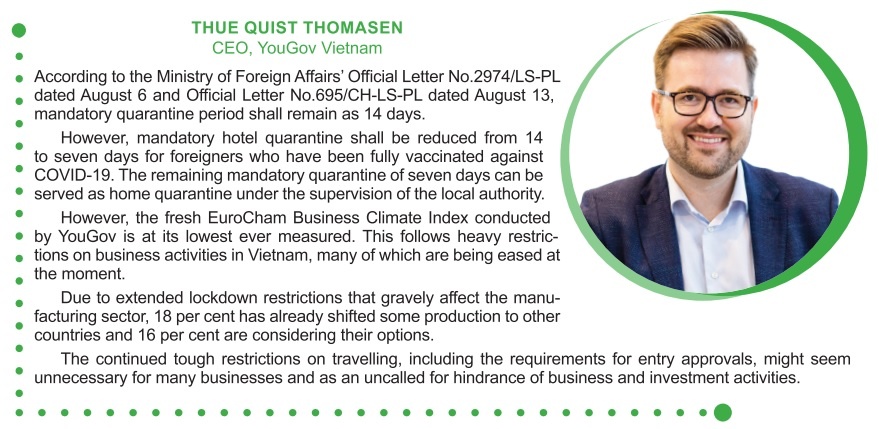Foreign expert influx inches closer
 |
| Projects such as Fujikin Inc.’s R&D centre, with a groundbreaking in Danang last week, will require the expertise of many overseas workers |
Vietnam is taking a step forward by reopening borders for non-national workers and experts to help enterprises revive their business. On October 3, Deputy Prime Minister Le Van Thanh signed the decision for the issuance of Directive No.27/CT-TTg on the restoration of industrial production. The Ministry of Foreign Affairs was asked to work with the Ministry of Public Security and relevant agencies to remove hindrances, creating favourable conditions for foreign experts and technical workers to enter the country and undergo quarantine in line with regulations of the Ministry of Health (MoH).
Last month, the government issued Resolution No.105/NQ-CP supporting enterprises, cooperatives, and business households, including easing several regulations and conditions on the grant, extension, and confirmation of work permits for foreign workers in Vietnam.
However, according to vietnam-visa.com, an assistance portal operated by Vietnam Discovery Travel, non-nationals who have valid visa or legal temporary residence cards still face numerous problems in getting approval for entering Vietnam.
As noted on its website, procedures and regulations on immigration and quarantine are different in cities and provinces, depending on the seriousness of local infections. Besides this, it takes a lot of time to proceed with paperwork and get in touch with local authorities to complete procedures.
 |
Waiting for approval
Ikeda Naoatsu, chairman of the Japanese Business Association in Danang (JCCID) spoke at a dialogue between foreign-invested enterprises in Danang with the city’s local authorities in late September, and stated that the association’s members are waiting for permission to resume operations at full capacity.
According to Ikeda, one of the most important factors to help manufacturers come back to normal operation is the arrival of foreign experts and the convenience of movement between cities and provinces. “They cannot enter Vietnam nor move between cities and provinces to monitor operations and repair equipment and machinery, which impacts their operations. Many contracts have been cancelled due to a lack of such experts,” Ikeda said.
The JCCID proposed that the country eases entry for foreign experts entering Vietnam. “We expect that the country will reduce the quarantine period for overseas experts who receive two doses of vaccine and have been tested,” Ikeda added.
The JCCID’s proposal reflects the opinion of numerous enterprises and associations in Danang and beyond. Together, they sent a document regarding difficulties related to foreign workers to the Government Office, the Ministry of Labour, Invalids, and Social Affairs (MoLISA), the Ministry of Justice, and the Ministry of Planning and Investment.
Meanwhile, for projects such as those run by Japan’s Fujikin Inc., it is essential to have a number of foreign experts permitted to enter Vietnam to work and also help train locals. Fujikin held a groundbreaking ceremony last week to promote a new a research, development, and manufacturing centre in Danang Hi-Tech Park.
A chairman of one leading developer of onshore wind farms in Vietnam told VIR that it is necessary to simplify the procedures for obtaining visas and work permits. “In numerous cases, when overseas labourers completed quarantine, their visa is only valid another one or two months – not enough time to complete their work. Furthermore, many experts simply refuse to enter Vietnam due to the complicated procedures,” the chairman said.
He added that it is important to accelerate the application of IT in granting work permits, thus allowing businesses to carry out procedures online.
Statistics from the MoLISA showed that as of June, there were nearly 8,500 highly-skilled foreign workers on a priority list to enter Vietnam. They involve some 2,000 employees of key national projects that use new technologies.
A publication by the General Statistics Office in June showed that in the first six months of this year, Vietnam welcomed 88,200 international visitors to the country, down 97.6 per cent on-year. These visitors were mainly foreign experts and technical workers.
Lack of policies
To ensure implementation of the goals of pandemic prevention and economic development, local authorities are working on the early deployment of vaccine passports to create more favourable conditions for foreign experts and technical works to enter the nation.
As of October 1, several international flights have brought people with vaccine passports to the country; however, these flights are part of a pilot project which currently faces several issues that are required to be ironed out in terms of logistics and cross-border integration.
According to Nguyen Thi Huong Lan, director of the Consular Department of the Ministry of Foreign Affairs, deploying vaccine passports does not mean that the country will be open on the same terms as before the pandemic. This endeavour would need to be implemented gradually and carefully in some locations, before expanding to the remaining localities.
Lan said that one of the criteria to recognise a foreign vaccine passport is that the document is issued by a country or a territory with a high safety index and widespread vaccination coverage. Thus, when that country or territory is no longer safe from the pandemic, Vietnam could consider stopping or suspending the recognition of these vaccine passports.
The MoH is assigned to complete the system for immigration management to welcome experts and Vietnamese overseas to Vietnam. The ministry is developing a closed management system from immigration registration to concentrated quarantine and medical monitoring at home.
Cities and provinces are also making proposals to ease the procedures and allow foreign experts to enter the country, including reducing the quarantine period.
Tran Huu The, Chairman of Phu Yen People’s Committee, told VIR that the province will give priority to vaccines for employees to help enterprises restore production. The province has also asked the Department of Health to propose solutions to bring foreign workers and experts back to work as soon as possible. “Vaccinated people are still subject to various coronavirus tests. If they test negative, the quarantine will be shortened to seven days. For those who have yet to be vaccinated, the quarantine period is still 14 days,” The said.
What the stars mean:
★ Poor ★ ★ Promising ★★★ Good ★★★★ Very good ★★★★★ Exceptional
Related Contents
Latest News
More News
- Foreign leaders extend congratulations to Party General Secretary To Lam (January 25, 2026 | 10:01)
- 14th National Party Congress wraps up with success (January 25, 2026 | 09:49)
- Congratulations from VFF Central Committee's int’l partners to 14th National Party Congress (January 25, 2026 | 09:46)
- 14th Party Central Committee unanimously elects To Lam as General Secretary (January 23, 2026 | 16:22)
- Worldwide congratulations underscore confidence in Vietnam’s 14th Party Congress (January 23, 2026 | 09:02)
- Political parties, organisations, int’l friends send congratulations to 14th National Party Congress (January 22, 2026 | 09:33)
- Press release on second working day of 14th National Party Congress (January 22, 2026 | 09:19)
- 14th National Party Congress: Japanese media highlight Vietnam’s growth targets (January 21, 2026 | 09:46)
- 14th National Party Congress: Driving force for Vietnam to continue renewal, innovation, breakthroughs (January 21, 2026 | 09:42)
- Vietnam remains spiritual support for progressive forces: Colombian party leader (January 21, 2026 | 08:00)

 Tag:
Tag:




















 Mobile Version
Mobile Version